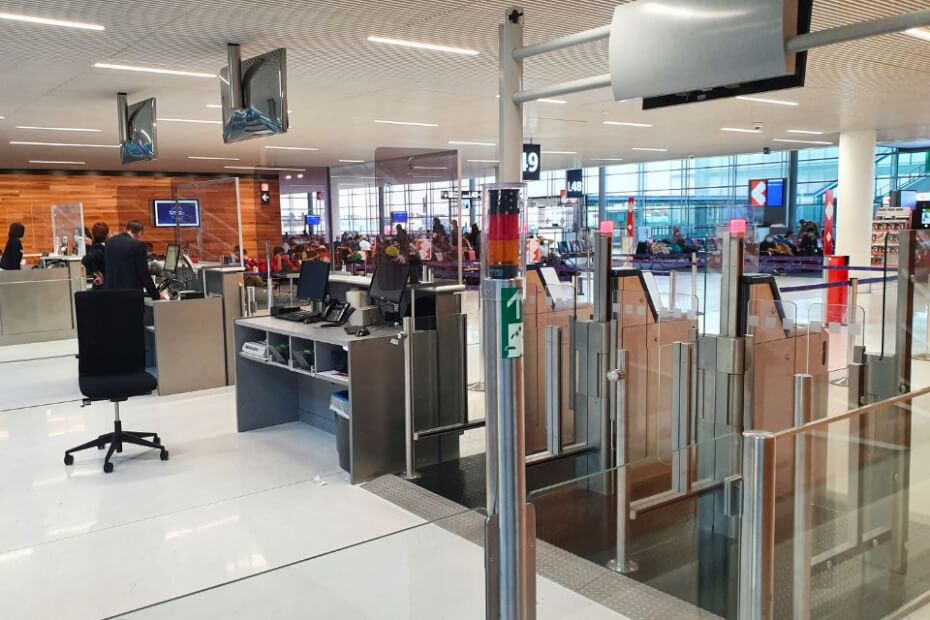
An official of the French airports union said the new mobile app for the European Union’s (EU) Entry/Exit System (EES) might not be very helpful.
The EES is the EU’s new automated border control system, recording entry and exits in the Schengen Area using biometric data.
It will replace manual passport stamping at the EU’s external borders on 6 November 2024, according to Nicolas Paulissen.
Paulissen, the L’Union des Aéroports Français (UAF) general delegate representing airports in France, is not optimistic about the EES mobile app.
He told The Connexion that, at the moment, it “will not have much impact on waiting times, which is a disappointment.”
Paulissen revealed travelers could only do a little with it since it does not take photos or register fingerprints.
“I don’t think it will be a miracle solution,” he said.
He said airports in Sweden where tests have been made “were not enthusiastic” about it.
EES app use will be voluntary among EU member states
Biometric registration before a border officer is one of the main concerns and causes of delay at the borders between the United Kingdom (UK) and the EU.
This is especially problematic for UK-EU juxtaposed border crossings. Juxtaposed border controls mean French border police check passports as people leave the UK.
Under EU laws, travelers must register facial and fingerprint data for the EES before a border officer the first time they enter the Schengen Area.
On future visits, travelers can use fingerprints or facial biometrics to confirm their permission and record their entry and exit.
Travelers’ data will stay in the EES for three years or until their passport expires.
It will refresh and keep their data for another three years each time they visit the Schengen Zone.
If their next visit to the EU is three years after their first EES registration, they must again register their biometric data before a border officer.
The EU’s EES mobile app should allow biometric registration ahead of time and away from the border.
Anitta Hipper, EU’s spokesperson for home affairs, confirmed that an EES mobile app is in development.
She said the EES mobile app “will be made available for Schengen countries from the EES start of operations.”
However, each EU member state’s decision to use the EES app will be voluntary.
“There is “no legal obligation to make use of it,” Hipper said.
Airports in Paris asked the EU to delay EES launch
Paulissen said the UAF was unaware that the French government had decided whether or not to use the EES app.
However, he revealed that the union had been negotiating with the EU to delay the implementation of the EES yet again.
Due to the Olympic games, airports in France will not have adequate time to prepare for the EES rollout.
The 2024 Olympic and Paralympic Games are scheduled in France from 26 July to 11 August and 28 August to 8 September 2024, respectively.
Due to the anticipated heavy traffic from the games, no construction work could be carried out at Parisian airports during that time.
As a result, French airports in the capital may be unable to set up sufficient EES kiosks to collect biometric data efficiently.
This is despite the EU requiring the Member States to set up the systems by the end of July.
Delay EES to prevent long queues and waiting time
Initially set in 2021, the eu-LISA postponed the EES rollout to May 2022 and then to September 2023.
Integrating the complex border system with a central database proved difficult for EU member states due to issues with their existing infrastructure.
It was pushed back to October 2024, as French officials did not want the new system to disrupt travel during the Olympics.
Member states must confirm by August 2024 that they are ready for the launch of the EES in November 2024.
“We want to delay it to the first quarter of 2025,” Paulissen said.
She added, however, that “the European Commission is fixed in its position” to launch it later in the year.
Thomas Juin, the president of UAF, said, “It is not looking good for waiting times. There are risks of really long queues.”
He also added that without additional police resources, the risk of chaos at the border would increase.
More groups are asking the EU to delay EES rollout
Several organizations have suggested that the implementation of the EES should be postponed until 2025.
Officials from the Port of Dover and the local community have warned that there could be 14-hour delays at the border once the EES is introduced.
The P&O ferry operations director asked the EU to postpone EES and suggested having an app, which is already in development.
High Speed 1 (HS1) and Eurostar had stressed that biometric registration upon arrival at the border would significantly impact operations.
The railway companies cited possibly limiting the number of passengers to avoid long queues at the border.
The port’s limited space makes it challenging for passengers to disembark their vehicles and register for the EES.
As a result, long border queues would impact nearby areas, causing traffic congestion and economic disruptions.
Similarly, St. Pancras Station in London has limited spaces and EES kiosks to process EES registration and checks more efficiently.

